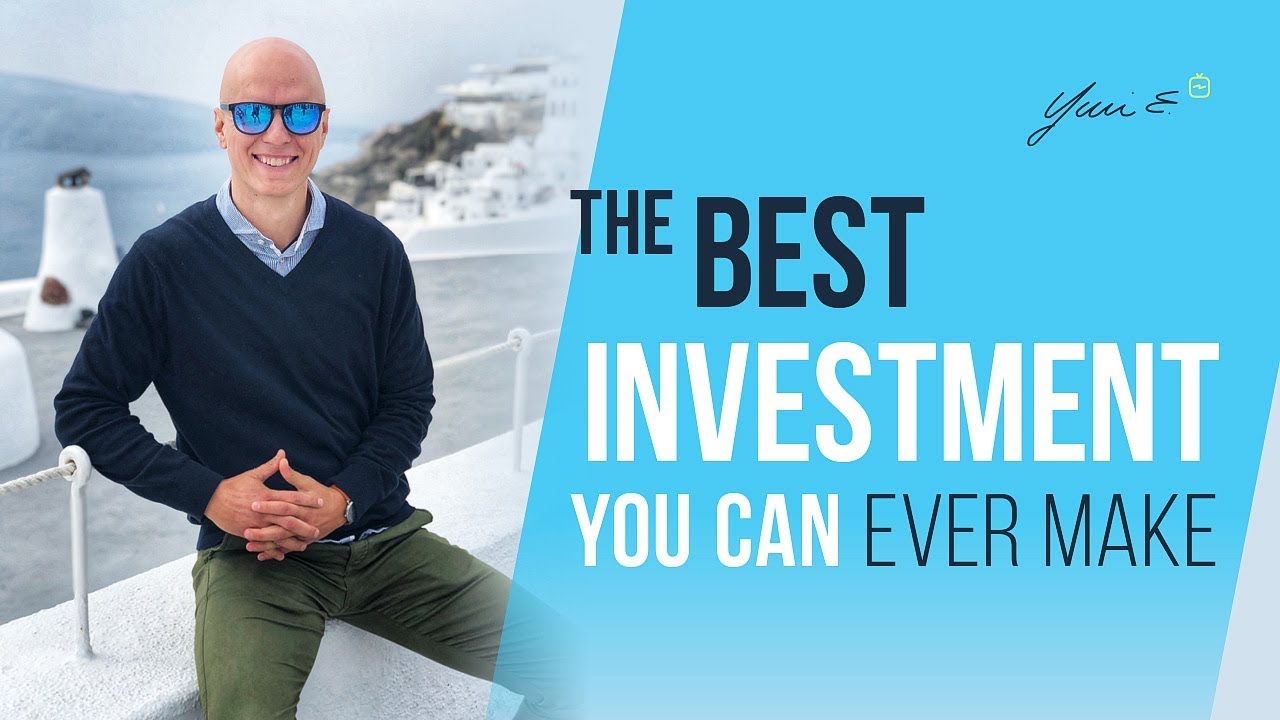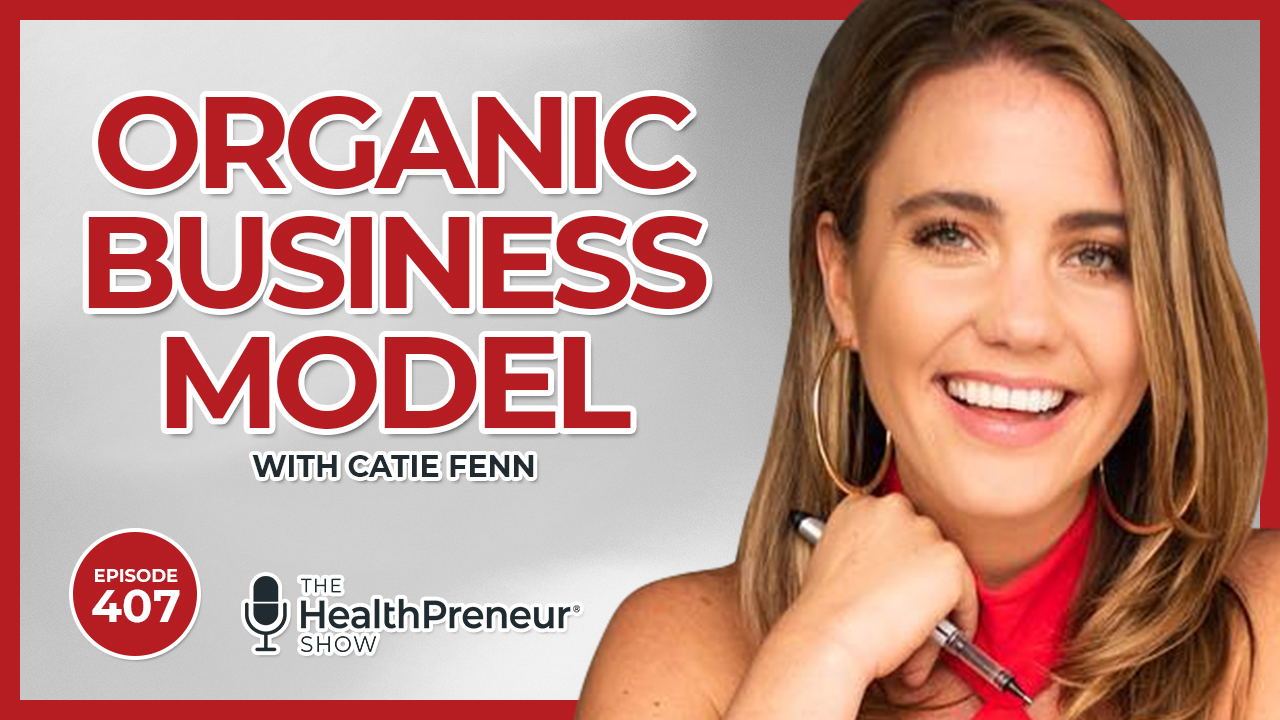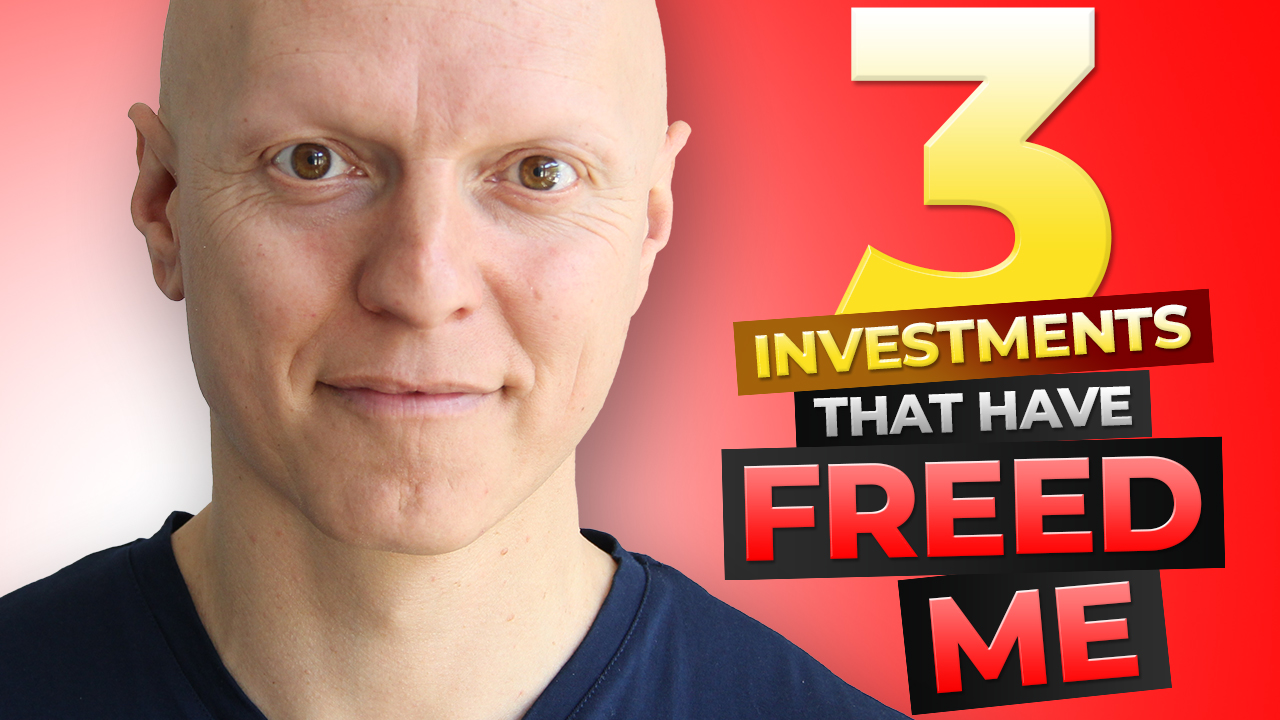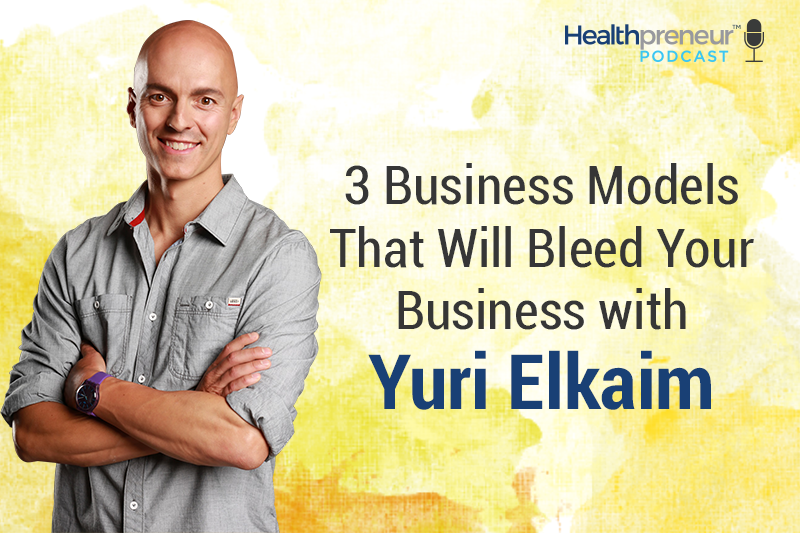What Dr. Daniel Stickler Learned After Investing $1.5M Into Marketing His Health Business
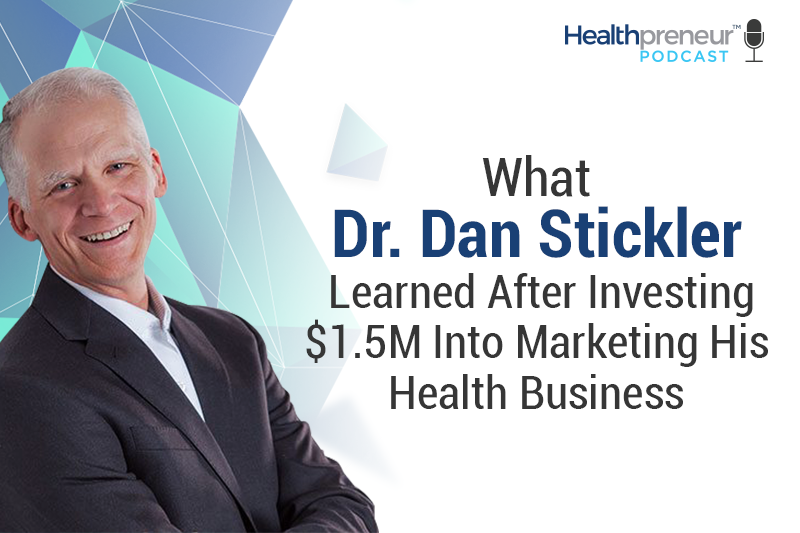
Today we have an incredibly motivated, persistent, and honest catalyst for change in the health and wellness community on the Healthpreneur Podcast. Having Dr. Daniel Stickler on the podcast is exciting for me because he is truly making strides towards creating a healthier future. He is super honest and open about his failures and weaknesses, and reveals how he moved past them and onto the sweet road of success. He has tons of experience and thousands upon thousands of dollars invested in lessons learned. Tune in for some wisdom-bombs that could save you money and time.
Daniel is a medically-trained doctor and surgeon that has mastered the craft of business and marketing. (Yes, it is possible to be a doctor and entrepreneur!) He’s the co-founder and chief medical officer at The Apeiron Center for Human Potential and The Apeiron Academy, and serves as medical director of the Neurohacker Collective.
I loved chatting with Daniel because he is passionate about seeing his vision to fruition. He is striving to shift our world away from the current “sick care system,” and is helping others to do the same through the Apeiron Academy. We discussed the challenges he faced being a doctor with zero business or marketing experience, and explored the most effective ways to get in front of your market and communicate so they’ll listen. Whether you’re a new Healthpreneur just learning the ropes or a seasoned professional, there are a lot of lessons that Daniel has learned that’ll benefit you and your business. Tune in and enjoy!
In this episode Daniel and I discuss:
- His trial and errors, and how he teaches by using his lessons learned
- What it took to realize what his market wanted
- His thoughts on the “sick care system” and his quest for a new paradigm
- How persistence sets apart the successful 2%
- Taking responsibility for your heath rather than being a sick victim
- The exciting leaps Daniel is catalyzing in the industry
1:30 – 5:00 – Daniel’s background, mission, vision, and mindset
5:00 – 10:00 – Business, marketing, challenges, and getting into concierge services
10:00 – 13:00 – Determining your market and effectively getting your message in front of them
13:00 – 16:00 – Your message and content should be about your client, not about you
16:00 – 23:00 – Building a business model, the value of lessons, and persistence
23:00 – 27:30 – The vision to shift a paradigm; the mindset of illness vs. the mindset of health
27:30 – 32:30 – The Rapid Five
Transcription
Hey everyone! Welcome back to the show. I’m excited to bring an amazing guest to you today. His name is Dr. Daniel Stickler. You’re going to listen to a medically-trained doctor who has taken it upon himself to master marketing and business development.
He’s going to share some of the lessons he’s learned after pouring over $1.5 million into marketing his business over the past several years. You’re going to learn the highs and lows and what he’s learned along the way.
Let me give you some of his background. He’s a future-focused visionary and a human potential evolutionary thought leader. He’s the co-founder and chief medical officer at The Apeiron Center for Human Potential, and The Apeiron Academy. He also serves as medical director of the Neurohacker Collective, which has many popular products for nootropics, brain health, and so forth.
He was very disheartened by our current sick care system, so he created the human potential medicine; an integrated biospherical systems approach that combines the scientific grounding and expertise of modern medicine, leading edge genetic and epigenetic science, and advanced neuro-psychophysiological modalities to synergistically expand human capacity.
Now, I know there are a lot of big words there. But basically, he’s on the cutting edge of getting down to the root, at a genetic level, of what makes people sick and how we can get them well.
Daniel, welcome to the Healthpreneur Podcast. How’s it going?
Daniel: Doing great, Yuri. I’m glad to be on.
***********************************************************
***********************************************************
Yuri: I’m happy to have you here! We are always excited to talk with amazing people in our space, whether they are medical doctors, personal trainers, or health coaches. It’s great to highlight people like you who are doing some awesome stuff.
What you’re doing is pretty cutting-edge, pretty leading-edge. What does your business model look like? If doctors or one-on-one practitioners are listening to this, can you give them a better sense of how you serve your audience using the Internet, and technology?
Daniel’s background, mission, vision, and mindset
Daniel: It comes down to our mission and vision. And our mission and vision is to change the whole landscape, the whole paradigm, of healthcare. We look at healthcare from a disease model, and the disease model is beyond repair. It’s at a point where we need a new model, and that’s what we’ve been doing in my medical practice.
That’s the business of medical practice. Because it’s a concierge practice, it requires marketing skills, and as a business it needs an entrepreneurial mindset. We also do training, where we train health and wellness professionals in this new model.
The Internet has been the number one resource for us in getting this message out. It’s amazing. We are training people from all over the world because of this Internet marketing aspect.
Yuri: That’s cool. A lot of doctors out there are not very savvy when it comes to business or marketing. Was that a challenge initially, or was that always something that was part of your wheelhouse?
Daniel: Being a surgeon, my ego told me that I could do anything I wanted to do. Fortunately and unfortunately for physicians, ego plays a big role. You think, “I’ve done this. I can do that. It’s just marketing. It’s just business.” We come from that world where you hang a shingle and they’ll come.
You’re never going to be unemployed as a physician, typically. But getting away from an insurance care model and moving into concierge services where people pay cash opens a whole new world. It’s eye-opening for physicians that get into this.
When I started this, I had no background in marketing or running a business. I had some major pitfalls along the way. I’ve had this entrepreneurial spirit all along with my medical practice, and it’s evolved over time. But some hard lessons would’ve been short-cutted quite a bit by some assistance, if I had been willing to ask or look for it.
Business, marketing, challenges, and getting into concierge services
Yuri: I bet. What were some of the initial challenges when you started your business? What was extremely foreign to you?
Daniel: I was doing laparoscopic gastric bypass, the weight loss surgery. A lot of people would shop around for weight loss surgeons, so I realized that I needed an Internet space for that. A lot of people pay cash, too, so it was a market where I had to get the message out. It wasn’t a competitive market, necessarily.
I needed to get in front of people that were looking for it. There were some hard lessons. I got on forums, and didn’t do Facebook. Initially, we were focused on forums, giving talks, and things like that.
It didn’t do well that way. If I had known how to do it right from the get-go, it would’ve made a big difference in the amount of time I spent on it and how busy my practice was.
But still, my practice grew.
We have this assumption that if you have something great and put it out there, people will find it. You can have the greatest program in the world, but if nobody knows about it, you’ll be in the homeless shelter. It’s hard to grasp that.
You think you’ve created an amazing thing and wonder why people aren’t coming. It’s because they don’t know.
That marketing aspect gives them the ability to see it.
Yuri: Yes, the field of dreams doesn’t happen online.
Daniel: No.
Yuri: If you have a physical clinic, maybe people will walk in. But not online. That doesn’t happen.
You mentioned forums as being something you did initially. Were there one or two big things that moved the needle for you guys to help get in front of more people?
Daniel: I think it was my transition. I started doing age management medicine as a hobby during my surgical career. I trained at the Cenegenics Institute, and they spend an entire day on marketing. I learned how to market, and to immediately respond when somebody reaches out for a contact.
I learned to have a series of email responders when they don’t respond, or after 30 days. I’d never even heard of that before. It was eye-opening for me to see marketing done for health. I hadn’t experienced it because you have no business training whatsoever in medical school.
You can get that in chiropractic because they rely a lot on marketing. But in medical school, there is nothing on that.
There’s no business training for physicians. So, you wing it. There’s a lot of trial and error and money spent on things that don’t work. Eventually, you hit something.
But learning what they taught at Cenegenics in the marketing and business development made a big difference. Even just using SEOs to name pictures on your website with keywords, which was something I never considered. My pictures on my website were just a series of numbers followed by a .jpg.
I had no idea how simple it was to build your SEO without having to invest a lot of money. People have the impression that you must invest a lot of money to search this out, but I’ve learned techniques over the years like looking at the people who like your page.
Creep on them a little bit. Find out where they shop, or what music they like. Learn the avatar of the people who follow your website. You’ll have your marketing niche right there, and free. You don’t have to spend a lot of money to have somebody identify that for you.
Determining your market and effectively getting your message in front of them
Yuri: True. Did you do those initial things yourself? Or did other people on the team do it for you, allowing you to just share your message?
Daniel: Well, it was a mixed bag. When I first launched my practice, I got all excited about business stuff and jumped full bore into it. I had money that the banks were willing to throw at me because I was a surgeon making a lot of money.
I took out big loans to hire a marketing firm and I think they spent $20,000 on just the logo and its patent. Before I knew it, I was almost $500,000 deep into developing the marketing.
I’d get the bills three months later and see that they had lunch with somebody, or went out to lunch to discuss us, and charged us for the lunch.
Yuri: Oh my goodness.
Daniel: I looked at that and thought, “Holy cow.” It was three months later, so I couldn’t stop it right then. I stopped it once I saw it, but I had already done three months of spending money on this stuff.
It left a bad taste in my mouth, so I completely moved away from asking anybody for help. I wanted to do it all myself.
I went from one extreme to another and finally started to settle into a middle zone. I said, “You know what? Be smart about this. Just shop for the people that really know what they’re doing and can help you.”
I spent all this time donating money to Facebook, as my buddy Nicholas Kusmich tells me. He is a true expert in that area and knows how to AB test. You get the money in initially to find out what ads are working and what aren’t, then you put your money towards the one that is working.
I had no idea. I just thought, “Oh, this is a cool ad,” and I’d throw it up there.
That was another hard lesson. We created websites and content that bragged about what we did and what we offered. They weren’t about the person reading it.
The lesson was to understand that you create websites and ads for the person. When they look at it, they should see how you’ll help them. You shouldn’t just say, “We’re awesome. Look at what we do.”
That changed how we went about marketing, creating websites, and creating landing pages. We realized it was about them, not us.
Your message and content should be about your client, not about you
Yuri: That’s a huge take away. It’s must always be about them. I’m happy you made that realization because as you mentioned before, for a lot of physicians and doctors, ego plays a big role in a lot of aspects.
The tendency might be to say, “Hey, look at me, I’m so cool. Look at all these degrees I have,” but no one cares about that. They care about their problems and how you can help them solve them.
That’s cool to hear from your perspective.
Daniel: Even in my free consult, I offer 30 minutes to talk to people to find if they are a client I want to take and if we have a program that matches their goals. In those conversations, I initially would spend 20 of the 30 minutes talking about what we offer.
I transitioned several years ago to just the opposite. I led them on with questions, and they spent 20 minutes talking about themselves, and I spent 10 minutes talking about my programs. My close rate went from about 20% to 80% when I did that.
That’s the thing: We get out there and tell everybody about what we do, but they just want to know what it’ll do for them. It’s hard to learn that, because all you want to do is say, “This program is so awesome. You can’t believe what we offer here.”
But if it’s not about them, it doesn’t make a difference.

Yuri: I can’t tell you how many things I have launched that have failed because of disobeying that law when I first started. I still see clients of ours, or just websites in general, looking at it from a third-party objective perspective, which is a lot easier than when you’re in it yourself.
It’s important to have that perspective because a lot of wasted time and money can go down that path. If you can avoid that by clarifying the message so people care, it’ll make a huge difference.
As you said, it’s the same idea with strategy or consulting calls. It’s all about them, it’s never about your stuff.
If you were to start all over again, what would you do differently? What’s the first thing you would do out of the gates, knowing what you know now?
Building a business model, the value of lessons, and persistence
Daniel: That’s a great question. That’s exactly what we teach our coaches in our training academy right now.
We teach the science of genetics and epigenetics, and apply that in a systems-based program. A large part of our training is on business model.
We ask: How do you spend money wisely? How do you assess whether stuff is working or not?
Coaches learn valuable lessons from my, probably, $1.5 million in investments over the years in failed outcomes that made a big difference. Looking back, we tried to launch a franchise, from scratch, back in 2004 or 2005.
We had a great medical program and we decided to open small franchises doing nutrition, weight loss, and exercise in the facilities. We entered the world of becoming a franchisor. Just the legal work alone was $60,000.
We went into it without a working model. I look back at it now, and I wonder what I was thinking. We hadn’t even created a model that showed that it was what people wanted. We just assumed that we love it, it works well, and it was a great program. We just assumed everybody would love it without testing it.
We opened our first facility and it floundered. We had some dedicated people, but it just never took off. We realized that, while we thought it was great, the public didn’t want it.
We tried telling them what they want, instead of listening to what they want. That was another failed business venture of mine that was a great lesson learned. It cost a lot to learn that lesson, but I carry that lesson with me all the time.
When I look at things, I think, “Is it something they want?”
Our academy is in a seed funding round because we’re going to launch it to a much bigger world audience. We have a model that works. We have 90 coaches in training right now from all over the world.
They are implementing the business practice with great success already.
I look at other genetic companies and am left with a bit of a sour taste in my mouth. There are companies that have started off with a business model and big-name investors. Two companies do something like what we do, but not to the same degree. We are a much more in-depth and scientifically and medically sound program. But they’re both funded at $30 and $40 million.
And they haven’t even created a business model that works. Because they have big investors that believe in them, they’ve got the money to do it. They are creating a program from a business model, whereas we’ve created the program and are creating the business model to move forward with it.
My opinion, based on my lessons learned, is that this is the model to move forward. You’ll have much greater success with a model that works from the get-go, rather then moving it into it with a larger-reaching high-investment model.
Yuri: It makes sense to help one person before you can help 1,000. Having proof of concept is important. I think there’s a lot of wisdom that comes with time, years of experience, and money spent.
There’s a direct correlation there. If you’ve invested $1.5 million in lessons learned, there’s a lot of value for people taking your course.
What do you think is one of the top traits or skills entrepreneurs must possess for lasting success?
Daniel: Persistence.
There are dark days for every entrepreneur. It’s never just success after success after you decide to become an entrepreneur. Failure should be expected. Entrepreneurs are a crazy sort of people.
I forget what the numbers are, but I think 2% of new startups go big time and become a successful company. Yet, every single entrepreneur in the space thinks that they are that 2%. It’s true insanity, but that’s the passion that drives the entrepreneur.
When you look at it, that’s not a very good success rate. But the entrepreneurs who are successful persist. They create one thing, and if it doesn’t work, they create something else.
Eventually, that 2% added up over time will hit on something. It’s just a matter of pushing through it. I’ve had times where I struggled to pay rent to just keep moving forward with the business. You’ve got to be able to accept that as an entrepreneur.
Unless you have a family fund that keeps you moving, you’re going to have some financial struggles as an entrepreneur in the early going.
Yuri: Totally. I think I remember Elon Musk saying that when he sold his shares of PayPal, he also asked a friend for rent. He reinvested all his money into SpaceX, or whatever else he was working on.
It’s true. I call it delusional optimism. You must have this belief to keep persisting. And I completely agree with you, that persistence is massive.
Do you feel that there’s a difference between persistence and patience?
Daniel: I don’t think any entrepreneur is patient. I don’t believe patience is a trait that makes a successful entrepreneur. I think it’s just the belief that it’s going to work, and the work ethic to make it happen.
The vision to shift a paradigm; the mindset of illness vs. the mindset of health
Yuri: Nice. What’s most exciting for you from the business perspective, and what’s your vision for what you’re looking to achieve?
Daniel: It’s exciting to have a greater goal than to just make money.
It’s not about making money. Most entrepreneurs in the space are there for the money and they don’t have the passion to drive a business and be persistent with it.
We are shifting a paradigm that has existed for a century; the disease model paradigm. Our passion is to show people that there’s an alternative. Healthy people, and even people with disease, are not relegated to that life.
Science shows that we can change outcomes through epigenetic expressions, nutrition, and fitness. Yet, it’s not taught that way in the health and wellness community.
Even in the alternative health community, they say they are not about disease model, but they are. They still promote things like, “Is your thyroid diseased? Do you need detoxification?” They say you’re sick and need help.
I like clients that say, “You’re pretty awesome to begin with, but there are ways to be better.” Our coaches are enjoying those clients, but it’s a new paradigm of health. People don’t realize that this is out there, and we are creating businesses around it. Our own health coaches have independent practices that are building around this model, which is exciting for us.
Yuri: That’s awesome. You mentioned that there still a degree of sick care to the alternative space. For the most part, humans are retroactive. They wait for crap to hit the fan before they act. A lot of people are motivated by fears.
Then there’s the other side of the spectrum, which are the optimizers, who see the value in optimizing where they are. Do you think we’ll ever shift to the optimization side of things, or do you think there will always be that spectrum that includes people who need something to happen to be motivated to act?
Daniel: There’s a split in the road there. That’s why I’m saying it’s a new paradigm, rather than trying to fix the old. They don’t go together. You either have the mindset of illness, or you have the mindset of health.
If you have diabetes, the sick care model says you have diabetes and need intervention. We say you have insulin resistance relating to a lifestyle pattern that isn’t conducive to your genetic expressions. We determine what we can do to optimize the outcome. You can sleep better, reduce stress, and eat less simple carbohydrates. Those kinds of things will resolve the insulin resistance that’s throwing the body out of homeostasis.
It’s a different perspective on it. I enjoy working with clients that have the perspective of optimization rather than the ones that say, “I’m sick, I need to be fixed.” It’s a whole different model, and it’s much more rewarding from my perspective.
Yuri: I completely agree. I’m sure you’ve found that the people who are optimizers take responsibility for their health versus those who are on the other side that believe someone else is going to fix them.
They play the victim. And that’s not a lot of fun to work with.
Daniel: No.
The Rapid Five
Yuri: Daniel, this has been awesome. Thank you so much for sharing. Are you ready for the rapid-fire, the Rapid Five?
Daniel: I’m ready.
Yuri: You have no idea what these questions are. Whatever comes to mind, top of mind, is probably the best answer.
Number one, what is your biggest weakness?
Daniel: Procrastination, for sure.
Yuri: Nice. I’m with you on that one.
Number two, what is your biggest strength?
Daniel: My belief system. When I believe in something, it is all-occupying in my thought processes and I make it happen.
Yuri: Nice.
What’s one skill you’ve become dangerously good at to grow your business?
Daniel: Managing money, and understanding investment versus ROI.
Yuri: Nice.
Number four, what do you do first thing in the morning?
Daniel: I typically meditate or work out.
Yuri: Do you do guided meditation, or on your own in quiet?
Daniel: I use the Muse headband.
I don’t have enough alpha activity, and it helps me get into that state. I like the neuro-feedback aspect of the Muse. I’m a strong ADD type, and my brain tends to wander. I sit in meditation, find myself down a road minutes later, and don’t realize that I’ve left. Muse quickly alerts me when my brain drifts.
Yuri: I love Muse, too. I use it every morning. I find that I’m the calmest after a workout. I didn’t work out the other day before I did a meditation. I was 74% calm during the 20-minute meditation, which for me, I’m usually 50 to 60%. So, I don’t know if you experience that yourself.
Daniel: It varies. I never know what the day holds, and it usually has a lot to do with my quality of sleep. I generally get good quality sleep. But, I’ll tell you, I hit 94% one day and had 283 birds.
Yuri: Nice.
Daniel: I took a screenshot of that one. I don’t think I’ve ever achieved that in any of the meditations before.
Yuri: That’s awesome. Finally, complete this sentence: I know I’m being successful when…
Daniel: When the new paradigm becomes a common paradigm of health for optimization rather than disease care.
Yuri: Awesome. I love it.
Dr. Daniel Stickler, thank you so much for joining us. Where’s the best place our listeners can check out what you’re working on and stay up to date with you online?
Daniel: Check out apeironcenter.com. Apeiron means limitless. And our training Academy is apeiron.academy. That’s the best place to find me.
Yuri: Awesome. Daniel, once again, thank you so much for sharing your journey. I know this’ll be inspiring for many listeners.
Daniel: Thanks, Yuri.
******************************************************
Yuri’s take
I love how Daniel pulled back the curtain and said, “Here are the highs and lows. Here’s what went down. And here’s what we’ve learned in the process.”
One of the reasons I love having these conversations is because each of these individuals is coming from a place of service and wants to solve a big problem. In this case, it’s getting to the root of disease and not having people rely on the sick care system that does nothing for most people.
I hope you’ve enjoyed this interview and found it inspiring.
While we are talking about cool stuff, have you checked out the Seven-Figure Health Business Blueprint training? It’s our newest training that’ll show you the new way to attract your ideal clients that are willing and ready to pay top dollar for your help to transform their life.
If that’s something of interest to you and you want to build a more profitable online coaching business that serves your clients at a deeper level and helps you make a lot more money and enjoy more freedom in the process, then I think you’ll enjoy that training.
Check that out over at healthpreneurgroup.com/training. Again, thank you for your attention and joining me on this podcast. If you haven’t subscribed, please do so today. We’ve got lots of great stuff coming your way over the next couple days, weeks, and months. I’ll see you on Friday with a great interview with Mr. Pat Rigsby.
Until then, be great, do great. I’ll see you on the next episode.
***********************************************************
Follow Dr. Dan SticklerAt:
https://www.apeironcenter.com/
***********************************************************
Free Healthpreneur Health Profit Secrets Book
*
If you enjoyed this episode, head on over to iTunes and subscribe to Healthpreneur™ Podcast if you haven’t done so already.
While you’re there, leave a rating and review. It really helps us out to reach more people because that is what we’re here to do.
What You Missed
In the last episode I talked about The Golden Rule of Marketing and How To Share A Message That People Actually Care About.
It’s all about being empathetic and in this solo round, I talk about “Emotion Inventory” and why is empathy so important in marketing.
I share with you examples of how to relate to your clients—and how not to—so you can create a true bond with your perfect client. After this quick episode you’ll walk away with a simple mission that’ll create a true difference in your clients’ lives and your business.
You can listen to the episode right here: The Golden Rule of Marketing



